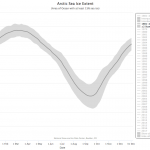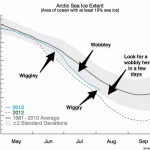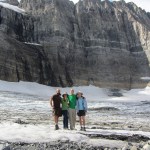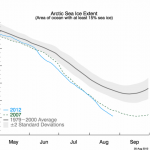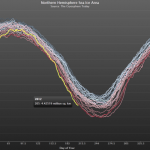sea ice
As we pass through Spring on the way to summer, the sea ice in the Arctic is starting to melt. The ice usually peaks by the end of the first week in March or so, then slowly declines for a few weeks, then by about mid-May is heading rapidly towards its likely September minimum.
With global warming the ice has been reaching a lower winter maximum, and a much lower summer maximum. This is caused by warm air and water, and it contributes to global warming. The more ice on the sea for longer, during the northern Summer, reflects away a certain amount of sunlight. With less ice, less sunlight is…
Dear Readers,
Find below an interesting press release I may as well share verbatim:
The rapidly melting ice sheets on the coast of West Antarctica are a potential major contributor to rising ocean levels worldwide. Although warm water near the coast is thought to be the main factor causing the ice to melt, the process by which this water ends up near the cold continent is not well understood.
Using robotic ocean gliders, Caltech researchers have now found that swirling ocean eddies, similar to atmospheric storms, play an important role in transporting these warm waters to the Antarctic coast—…
Yay, more nonsense about sea ice: the traditional "US Navy predicts summer ice free Arctic by 201x", where this time x=6. Does anyone actually believe this rubbish? If so, I have money just sitting around, bored, twiddling its little green fingers and waiting to take your bet. If "summer ice free" means "oh yeah, not actually ice free, but less than 1 million square km" then please form an orderly line. Even odds, let's say £1k. Who's first up?
Do I see Nafeez Ahmed there? Or Wieslaw Maslowski? No? How odd.
Found by the lost [*]:
* Ed Hawkins @ed_hawkins: Brave prediction by Maslowski for…
Well, you may call me a wild-eyed jumper-in-too-early but I'm going to call this year's sea ice as "unexciting".
There's maybe a month left, but there's no way its going to fall off the scale in that time [*]. Indeed, its looking pretty middle of the road: about the same as 2010 or 2008. Its important to realise, of course, that this isn't desperately surprising, unless you're a "death spiraller". If you're an "IPCC is roughly right"-er then that level of decline is quite bad enough to fit in with all the std type projections. If you are a death spiraller, then you're a looney, but I've said…
Large ponderous entities like the IPCC or government agencies like NOAA take forever to make basic statements about climate change, for a variety of reasons. They are going to have to speed up their process or risk losing some relevance. Among the coming problems we anticipate with global warming will be events that have huge, widespread effects and that happen in time scales of weeks or months, or a season, and having a nice governmental report about it two years later isn't going to do anybody any good. So let's see to that problem, please (looking sternly at IPCC and NOAA).
But that's…
Its well past time to look at the sea ice extent. I don't have much to say, so here is a picture:
We're currently well above the minimum - indeed, we're pushing the maximum of the AMSR era. That's not as meaningful as it might be, because 2012 was quite well up until only a few weeks back, so this could all change. But PIOMASS, too, is showing a slight recovery from last year instead of monotonic decline. This should all be no great surprise - we don't expect monotonic decline.
As usual, if you actually care about seaice you're probably better off with Neven.
Refs
* Girding my loins: sea ice
Its hardly an original question. And the answer (we don't know) isn't original either. In case you were wondering, this is Overland and Wang, GRL 2013, doi: 10.1002/grl.50316 (PDF courtesy of V). Different but not entirely different to A sea ice free summer Arctic within 30 years?, also in GRL; or even A sea ice free summer Arctic within 30 years-an update from CMIP5 models by Wang and Overland.
W+O discuss three methods for predicting future Arctic sea ice: extrapolation, wild guesswork, and cherrypicking your favourite model (of course they don't use those names, they've made up some…
This is not the sea ice post you were looking for. However, it is a placeholder for putting comments, including linking to previous comments.
If I'm feeling energetic I may even make the linkages myself.
The pic shows seaice at "normal" ish; but that means little, as 2012 was also "normal" at this time of year. PIOMASS might be more interesting (thanks CR) but a month of more will make that clearer.
Early update: Oh well, since its there, Open Mind's Arctic Sea Ice Loss, part 1 is worth a look, esp. figs 2 and then fig 6 (though I don't think the quadratic fit is meaningful. Unless you can…
And not before time, you might say. Sea ice this year reached a new record minimum in the Arctic (though not in the Antarctic, which begins to look wind-driven. And before you think the two trends might be opposite-and-nearly equal, look at Tamino's convenient analysis which I can never find). Which means I lost some of my bets. Now, what exactly was I betting on?
Crandles helpfully points me at Betting on sea ice: $10,000 although the $10k doesn't fall due until 2016. But in the comments (the one from 2011/07/04, since perma-linking here remains invisible to all but me) we agreed:
we are…
One of the most commonly winged-about facts of Earth's climate change we hear from science denialists is that sea ice in the Antarctic is increasing, therefore, there is no global warming. The fact that every other measurement of temperature and ice-osity indicates warming and melting would make a normal person think of the Antarctic situation as odd, and seek explanations, but somehow this logic does not emerge in the minds of the denialists. It has been suspected, and increasingly confirmed, for some time that the increase in sea ice in the Antarctic is the result of changes in wind…
There's a nice paper out by Holland and Kwok, attributing much of the somewhat-hard-to-understand change in Antarctic sea ice to changes in wind forcing. The growth in Antarctic sea ice, although much smaller than the decrease in the Arctic, is still a bit embarassing; it would be much tidier if it were decreasing. The abstract says:
The sea-ice cover around Antarctica has experienced a slight expansion in area over the past decades [1,2]. This small overall increase is the sum of much larger opposing trends in different sectors that have been proposed to result from changes in atmospheric…
"Everybody knows that the dice are loaded
Everybody rolls with their fingers crossed
Everybody knows that the war is over
Everybody knows the good guys lost
Everybody knows the fight was fixed
The poor stay poor, the rich get rich
That's how it goes; everybody knows." -Leonard Cohen
As you know, last week I took my first week off of the year, and went on a trip to Glacier National Park, which was my very first time there. Although I've spent a lot of time in the mountains, including some pretty icy and snowy places, I'd never walked on an actual glacier before. All of that was about…
August sea ice extent in the Arctic this year was 640,000 square kilometers below the previous record set in 2007. It is also already a record monthly low for any month, though that record will not last as it is going to be broken this September when the lowest extent of the year is normally reached. In less than the last two months, multi-year ice declined by 33% and the oldest ice (over 5 years) declined by 54% (and that ice ain't coming back). While the unusual Arctic Cyclone probably had a noticeable impact on the evolution of this year's (still deepening) record ice loss, it…
As Eli Rabbet is noting, Anthony Watts is really unraveling, even further than we noted here a couple of days ago. So, I just have to post the video below, picked up from Denial Depot. I swear, I am NOT calling Watts Hitler, not even a Nazi, it is just pretty funny!
So as I warned about some weeks ago, almost all of the record lows are already broken in the arctic sea ice front. Neven seems to have the best discussions going, but he is on holiday for the next couple of weeks. You can see almost all (all?) of the scientific surveys of the various ice metrics in this single page jam packed with graphs here. It's a fantastic resource with links to all the original data sources. I found it at Neven's, not sure if he created it but many thanks are owed to whomever it was.
And we still have as much as 4 weeks of likely declines…
People want to talk about sea ice, clearly. I still have nothing interesting to say about it, so instead, lets start off at KK's, who parrots the odd assertion that there are "Plenty of stories in media with just one scientist, and no counter view at all". Which in turn is some septic whinging that he doesn't have a clue about sea ice.
Ben Pile is so clueless that he thinks that, when "Laxon referred to measurements taken ‘this decade’", he "presumed to mean since 2010". Pile, in turn, is parroting Orlowski in the reliably unreliable El Rego, which says Listeners to Radio 4's Today programme…
Via HT I find Kerry Emanuel saying:
I think debate is good but we should be debating points that are actually debatable
and who could disagree with that? But the problem is who gets to say what is debatable. You and I know, of course. But the wackoes don't [What is the Plural of "wacko"? Is it -oes or -os? And what about "Bozoes" - that looks wrong]. Or rather, it is impossible to distinguish from outside their heads the difference between "this is debatable" and "I'm going to force you to debate this if I can, either because it plays well or in order to avoid debating real issues" (compare…
Some interesting goings-on in the cryosphere these days.
In this chart (click the link for an interactive, larger resolution version) from the cryosphere today we can see that we are on the 45th day in a row of daily record lows in sea ice area.
Note that this is area which is different from extent. Area refers to the actual ice cover, I am not sure of the details of how that is defined in practice, whereas extent refers to any ocean surface that contains 15% or more ice cover. Again, there will be technical details I am not familiar with for determining the edges of extent (e.g.…
Arctic Methane Emergency Group? refers. Via GP I find this discussion on a "geoengineering" newsgroup (gosh how quaint - people still use newsgroups? Maybe retro is back). AJL finds my article "damming" but Ken C finds it "a little distasteful". But both are worried, quite rightly, about credibility if the AMEG's wilder claims (and people) aren't challenged.
Ken C points to September Arctic sea ice predicted to disappear near 2oC global warming above present (JGR, doi:10.1029/2011JD016709) which is interesting, because that is very non-catastrophic and very non-nearterm: 2 oC puts it at ~2070…
I used to like the IJIS sea ice pic for comparing this year's progress. And them AMSR went down (I hope I've got that right, I really wasn't paying attention) and they stopped updating. But C points me to
which, while not so pretty, is a good substitute. That comes from http://gfspl.rootnode.net/index.php/arcticiceart which has others.
This post was mostly for me to link to the pic for my own convenience. But we could also look at it... too early to tell, but we seem to be bumping along at the bottom of the range at the moment. Time will tell.
